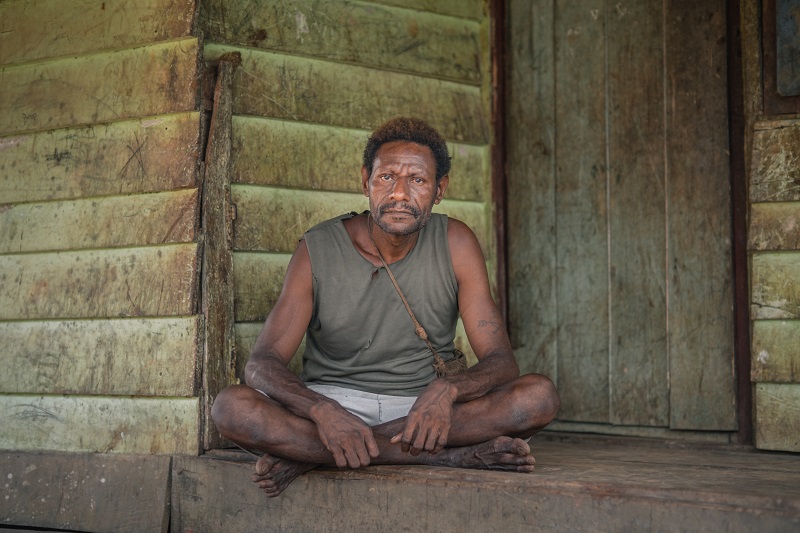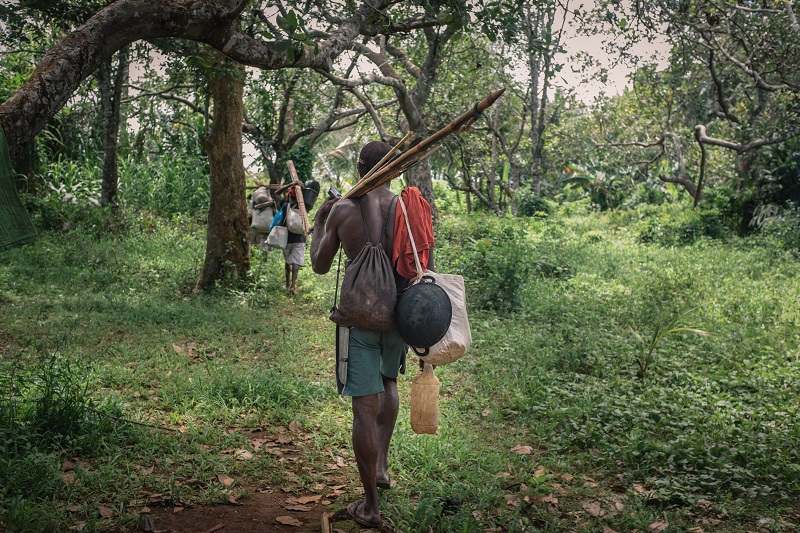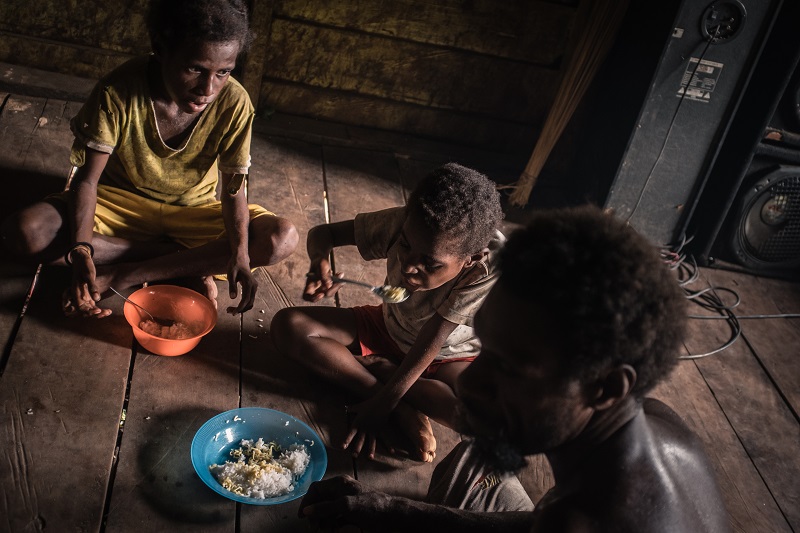Green money has been spent cutting down trees for biomass electricity and destroying traditional indigenous food sources.
Millions of dollars have been invested in the Papua Rainforest Deforestation Project to help Indonesia reduce carbon emissions.
The money was used to help Indonesian conglomerate Medco Group build a biomass power plant that generates electricity by burning wood.
Medco has already cut down large areas of forest and replaced them with forest plantations.

Deforested land (Photo: Albertus Fimbrianto)
As a result of this funding, the company plans to expand its farms to at least 2,500 hectares — seven times the size of New York's Central Park — and clear more rainforest.
The project made it difficult for the marindas, hunter-gatherers, the indigenous inhabitants of the Papuan lands, to find food.
Because grocery stores are so expensive, many families go hungry on rice alone. Children were dying of malnutrition.
torn rainforest
The Medco project began in the late 2000s as part of Indonesia's efforts to turn southern Papua into a source of food and energy.
The company's original plan was to plant a large forest plantation that would produce wood chips for export.
Medco has been licensed for approximately 170,000 hectares, which is largely the same as the land of Marind's ancestors in Zaney.
FSC plans to restore devastated forests after new allegations
Villagers say that before deforestation began, they could find food within walking distance of their homes.
The cassowary, a flightless turkey-like bird, was often seen in their backyard.
Wild boars and kangaroos roamed the city, and the swamps teemed with fish.
First Promises
However, some townspeople welcomed the arrival of Medko. The company allayed fears by distributing money and promising jobs, supporting children's education and new schools, churches and medical facilities.
In 2009, the company signed a written agreement to protect sacred sites, sites of cultural interest, fishing grounds, and what Medco called "other sites deemed important to the community."
“In the beginning, everything was fine because people found work,” said Amandus Gebzi, father of nine of Marinda's children. “Everyone was involved in the work without exception.”

Amandus Gebze, Marind, father of nine children. In April 2022, two of her children died and two suffered from malnutrition. (Photo: Alberto Vimbrianta)
But after a few years, the townspeople dispersed. Medco's regular income dried up, and she was largely replaced by odd jobs collecting small pieces of lumber at $5 a cubic yard.
When asked why workers lost their jobs, Medco said it stopped enrolling in 2014 because it was losing money. But he added that he had moved from hiring staff directly to working through "contractors or third parties."
The company then indicated that the citizens lost their jobs because they could not "follow company rules" and were "frequently absent" and were thus considered laid off.
Food sources have been destroyed.
Some villagers have returned to hunting to support their families. But Medco has replaced ten kilometers of natural forest with an artificial plantation of the same trees.
Nine villagers interviewed said that it had become more difficult to obtain traditional food.
Now they had to travel up to 15 kilometers to catch a kangaroo or a deer, and they often returned empty-handed for several days.

Marinds are hunter-gatherers who hunt game in the forests surrounding their village. Since the founding of Medco, they have had to travel more in search of food. (Photo: Alberto Fimbrianto)
Sago plantations that produce a starchy product such as tapioca are not cut down. But the wasteland was tainted with dirt and chemicals.
As sources of free local food dwindle, citizens are forced to buy fast food, which often costs more than an upscale supermarket in Indonesia's major cities.
plain rice
Due to the lack of steady income and the decline of traditional food sources, some villagers tell us that rice, the staple food they call nasi kosong, or "plain rice", has become the sole staple.
The Gecko Project notes that Amandus Gebze's family prepares a rice breakfast with two bags of pasta divided between his parents and his six siblings.

In the village of Zanegi, on the Medka farm, some families now eat whole rice dishes with instant noodles if they have money. (Photo: Alberto Fimbrianto)
Some families pepper rice to make it edible. Others bathe in salt water or drink large amounts of water to make swallowing easier.
In April 2022, health workers stationed in the village told Project Gecko that four children were malnourished and eight pregnant women suffered from chronic energy deficiencies, putting them and their children at risk.
Medical records obtained by the Indonesian newspaper Kompas last August showed that nearly a third of young children are stunted.

Little Marinda at her home in Zaneh. Marind families are usually large, in some cases more than 20 people live in a small house. (Photo: Alberto Fimbrianto)
Nine children in Zanig have reportedly died of malnutrition since 2012. The Indonesian newspaper Kompas found that one family lost three children between 2019 and 2021.
Its not our fault
Medco dismissed the idea that it could be related to their project. “Medco Papua operations do not cause malnutrition,” he said. Common food sources were not affected.
However, he said that "Gekko Project's allegations of cases of malnutrition need to be investigated in more depth."
Medco has broken promises to the community, beyond a written agreement, to protect its food sources and other key areas.
He claimed that he made an effort to help improve the community's living conditions, despite the fact that his project was losing money.
Increase green finance
Medco claimed that progress on its project was limited to a 3,000-hectare site because it was not economically viable.
This is supported by satellite imagery which shows that deforestation around Zaniga quickly stopped in 2010 and largely stopped in 2014.
But in 2017, the Indonesian government breathed new life into the failed Medco project.

A Medco truck transports logs along the road between the forest and the clearing. (Photo: Alberto Fimbrianto)
He provided Medco with funding to build a new biomass plant 20 kilometers from Zanegi, and the state-owned electricity company committed to buying the electricity it would generate.
Satellite imagery shows a new power plant 20 kilometers southeast of Zain in late 2018. Deforestation will also start in 2021 in northern Zania.
Media Trustees
The first part of the state funding came from the state-owned PT Sarana Multi Infrastruktur (SMI), which is under the control of the Ministry of Finance.
In 2017, it provided Rs 60 billion (US$4.5 million) to Central Project Finance.
SMI was founded in 2009 to finance infrastructure but has increasingly focused on helping Indonesia meet its climate change commitments.
Bethlehem, the gateway to the Amazon, will host the COP30 climate conference.
The 2017 Sustainability Report states that the Medco power plant can help Indonesia achieve the United Nations Sustainable Development Goals (SDGs).
In a 2020 presentation, the media director presented the plant as an example of "climate change mitigation financing".
This is despite public statements from non-profit organizations, including the United Nations, that the Medco Marind project is starving.
SMI does not want to comment.
Trustees - IEF
In 2021, the Energy Department and Medco said another government fund, the Indonesian Environment Foundation (IEF), also provided "financial support" to the biomass plant.
The total funding has reached $140 billion, over $9 billion, said Budi Basuki, senior executive at Medco.
The IEF was created in 2019 as a body that can be used to implement environmental investments.
By the time Medco secured IEF support, it had already cleared about 3,000 hectares of forest.
Governments fail to respond to UN call for drought in East Africa
The company said it would need to nearly double the size of the farm to meet the needs of the plant, and would continue to use wood from the forest as it was cleared.
He also hopes to triple the plant's capacity, creating demand for more land and timber.
Government maps show that, as of 2012, large areas of the grant remained untouched or "first class" rainforest and swamps.
An analysis of satellite imagery by The Gecko Project shows that the area is untouched. These landscapes contain large amounts of carbon and are released when they are washed away.
IEF's Inda Tri Kurniawati said the area was designated "artificial forest" and said Medco has the right to clear the forest and replace it with a farm. “According to the laws and regulations in force, they can do it,” he said.
Joint shot of pure zero
The Indonesian government's support for biomass in Papua is not an aberration.
Instead of shutting down coal-fired plants, he plans to keep stoves burning but phase out fossil fuels by "co-burning" biomass.
Last June, Energy Secretary Erivin called dumping such "general fire" the centerpiece of his strategy to reduce carbon emissions.
While Merauke's business is small compared to the vast network of power plants scattered across Indonesia, dozens of power plants also burn biomass.
Veto issue suspends Paris Plastics Agreement talks
The state-owned energy company PLN announced in 2022 that it wants to quintuple its use of biomass next year and has set a goal of burning 10.2 million tons by 2025 at more than 50 power plants.
According to PLN, by 2022 most of its biomass will come from waste products such as sawdust, rice or palm oil. But to meet the growing demand, they need farms.
The Ministry of the Environment supported this policy.
At the United Nations Climate Conference held last November in Egypt, Agus Justianta, Director General of the Department of Sustainable Forestry Management, said it would "promote forests for energy development" and could use more than 1 million hectares of "forest products" . .
Trend Asia, a policy-monitoring non-profit organization, believes that at least 2.3 million hectares of land, half the size of Denmark, must be converted into farms to meet this demand.
United Nations Recommends Unbalanced Carbon Removal Technologies
The government is proposing to set up leshozes on "degraded" lands, and this could happen now. But, as with the Medco project, they are often planted in place of rainforest, giving investors the opportunity to create a steady stream of timber before the plantations reach maturity.
“The use of biomass is renewable in theory but not in practice,” said Yoen Indrade of Trend Asia. "Forest plantations have been an important driver of deforestation. So we are concerned that this is likely to lead to deforestation."
"No hope"
In Zane, Marind spent more than a decade watching how politics reached thousands of miles and how the vagaries and vicissitudes of society could affect their lives.
Natalia Mkhuz, wife of Amandus Gebze, was barefoot with her three-year-old son Ephraim in the shade of a tree near a medical center in the city of Zaniye in April 2022.

Natalya Makhuz with five children. Two of them were malnourished in April 2022. One was suspended from school and received additional food from local health workers. (Photo: Alberto Fimbrianto)
The midwife came out with a digital scale. He gave him the name Ephraim, and his mother showed on the scales: 10.7 kilograms - the weight is insufficient for his age.
The midwife gave Ephraim a box of biscuits to complement his diet and took a picture of him on his cell phone with the box in his hand. His mother gave him a second one.
"Please don't tell her siblings about this," Natalie's midwife said. "I'm all for him."
Ephraim was born just at the moment when Medco completed the construction of a power plant in Merauke.
It was good, - said Natalia. "It's very difficult right now."
Her husband Amandus, once optimistic about the Medco project, doubted it would reach his family.
“If they want to develop the community, they will need more of our land,” he said. “If we have to give away more land, is there a chance that we will be more taken care of? There is no hope."
This story was published in collaboration with Project Gecko, Project Multatuli, Mongabay and Climate Home News.



